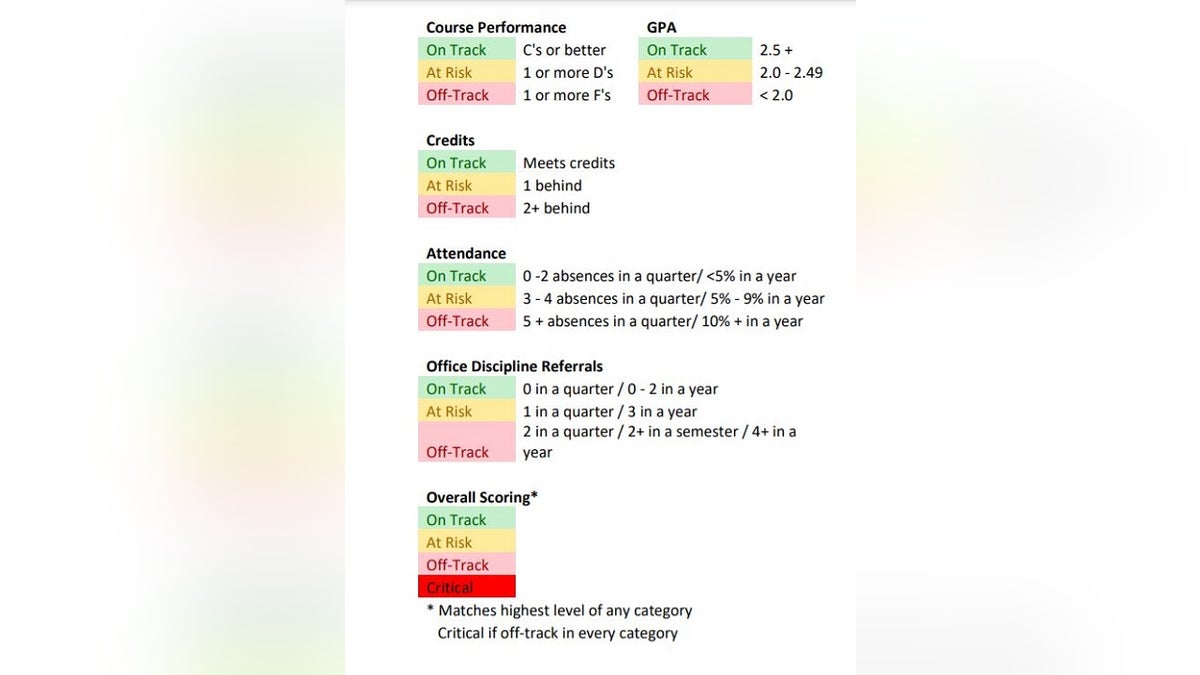Fox News Flash top headlines for November 19
Fox News Flash top headlines are here. Check out what's clicking on Foxnews.com.
A Florida sheriff's agency has a secret list of students it believes could "fall into a life of crime" based on their grades and discipline histories, according to media reports.
The Pasco Sheriff's Office uses data from the Pasco County Schools district and the state Department of Children and Families to compile a list of children from middle and high schools, the Tampa Bay Times reported.
Elementary schools are not included.
The district's data shows which students are struggling academically and have missed too many classes, and the FDCF data shows which have been victims or witnesses of child abuse. Parents and students apparently were unaware of the list, according to the newspaper.

Cypress Creek Middle School of the Pasco County Schools district. (Pasco County Schools)
The sheriff's office has its own information that -- combined with the other two data sets -- goes into a system that scores children in 16 categories. They are each assigned a label: On Track, At Risk, Off-Track or Critical.
In a statement to Fox News, the sheriff's office said the list has been mischaracterized. The agency said it's not a list of those who may become "prolific offenders" but rather a list of those at risk for truancy, mental health issues, self-harm, substance abuse and crime.
An 82-page manual school resource officers and deputies are required to read fails to mention the other risks. Instead, it offers five statements that describe efforts to identify kids who are likely to become criminals.
"These programs, in conjunction with the School District’s Early Warning System, provides recommendations to community or school based programs or resources, and mentorship to those who have experienced adverse childhood experiences, something academically proven to lead the possibility of increased victimization, mental health concerns and other aspects," a sheriff's spokeswoman said.
The Early Warning System tracks students' grades, attendance and behavior.
What qualifies for an "at risk" designation could be anything from getting a "D" on a report card to missing school more than three times in a quarter, according to the manual. Other factors include witnessing domestic violence, having a parent in prison and being the victim of abuse or neglect.
The list was most recently updated in October.

Information from the various criteria or categories is used to designate students as one of four labels: on track, at risk, off track or critical. (Pasco County Sheriff's Office)
The list is used by deputies assigned to middle and high schools to offer “mentorship” and “resources” to students, the sheriff's office said. The agency cited to the Times a program where school resources officers provide clothes to children in need and took children fishing.
It said its data-sharing practices with the school district goes back 20 years and are intended to keeping school campuses safe. Only a juvenile intelligence analyst and the school resource officers have access to the information, it said.
School District Superintendent Kurt Browning and the principals of two high schools told the newspaper they were unaware the sheriff’s office was using school data to identify kids who might become criminals.
“We have an agreement with the Sheriff’s Office,” Browning said in a statement. "That relationship has been strengthened in the wake of the tragedy at Marjorie Stoneman Douglas High School in 2018, and that includes processes for a two-way sharing of information that could save lives and result in timely interventions with students who are at risk.
"If there is any need to revisit any aspect of our relationship, we will do so in a thoughtful manner with the goal of keeping our students and staff safe," he added."
He did not express concern over the sheriff's office's actions. Messages from Fox News to school board members were not returned.

(Pasco County Sheriff's Office )
The district pays $2.3 million annually to place 32 deputies in its middle and high schools.
CLICK HERE TO GET THE FOX NEWS APP
Critics said the program could be a misuse of the children's' information
"Can you imagine having your kid in that county and they might be on a list that says they may become a criminal?' Linnette Attai, a consultant works with student privacy laws, told the Times. "And you have no way of finding out if they are on that list? This is a district that is sending millions of dollars to the sheriff of Pasco County to target its students as criminals."



